Neutrals are still in — but not without texture, contrast, or warmth. These 10 white tiles combinations are what’s working now, with quiet upgrades that can transform even the most basic layout.
White tiles have long been seen as a default choice—safe, simple, and easy to clean. But they’ve also grown into something more versatile. Today, white tiles are being used in surprisingly creative ways.
In Indian homes, white tiles have added appeal. They work across styles, seasons, and budgets. White tiles help balance out strong colours, soften dark corners, and keep interiors cooler in warmer regions. But white alone can sometimes feel too plain. And in 2025, the conversation isn’t just about using white tiles. That’s where white tile pairings come in.
From bold contrasts to tonal layers, here are 10 white tiles combinations that make your interiors more interesting — and far more functional.
White Tile Combination with Wood Textures
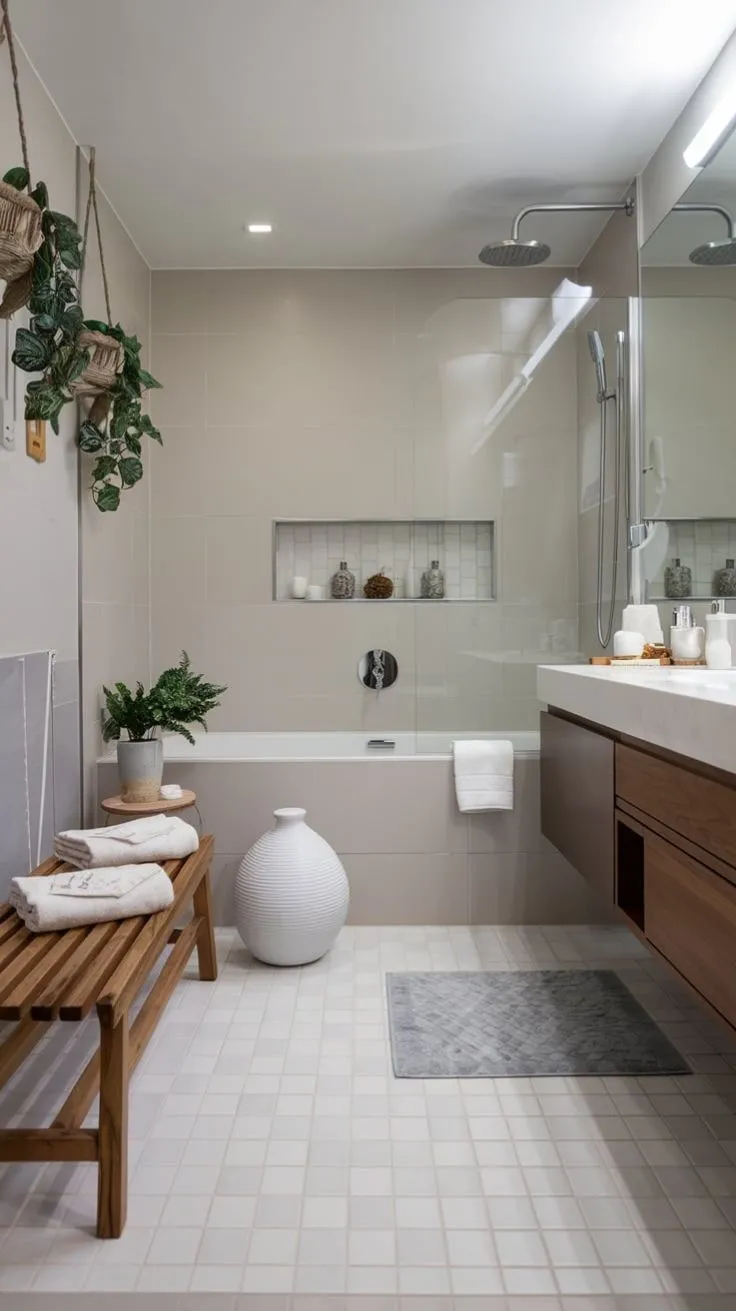
A simple switch to natural wood can make white tiles feel instantly warmer and more grounded.
This is a pairing that brings warmth without crowding the space. Natural wood — even when used sparingly — softens the crispness of white. Think of a white tiled wall beside a wood-laminate floor, or white floor tiles framed by wooden skirting.
In smaller Indian apartments, this mix creates a fresh, balanced look. The white reflects daylight; the wood grounds the space. Lighter oak tones feel airy and clean, while dark walnut or sheesham brings depth.
Glossy White Tiles with Patterned Cement
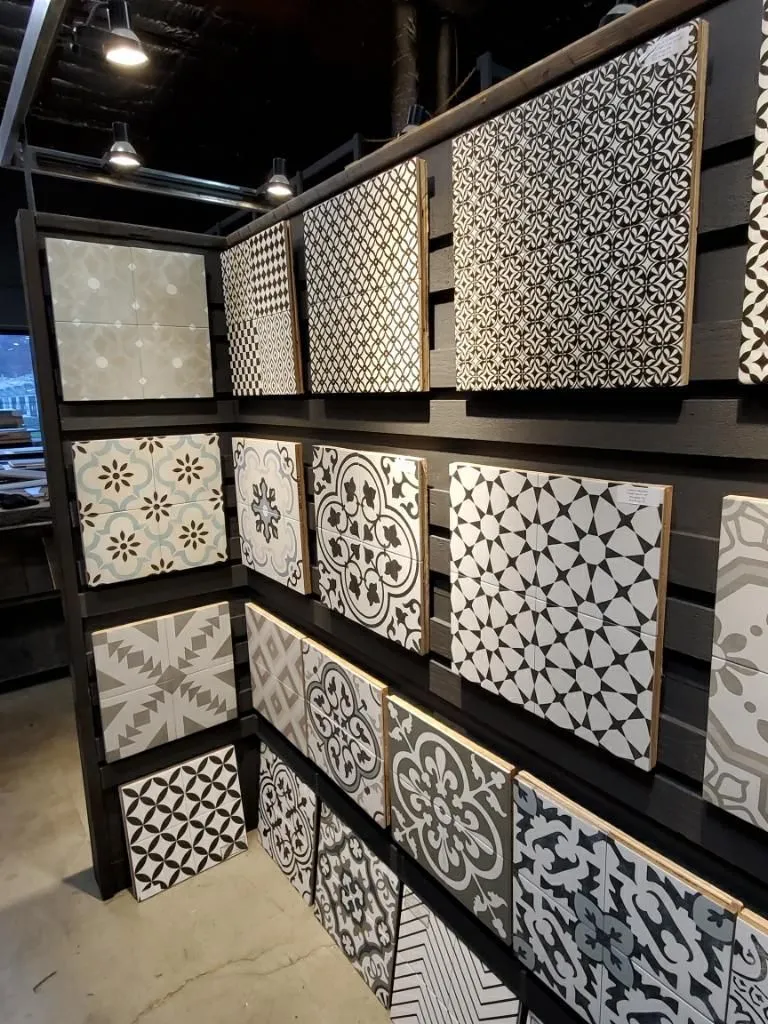
Patterned cement brings in contrast — without overwhelming the crisp clarity of white tiles.
Cement tiles bring in boldness — often in earthy reds, blues, or mustard tones. Combine these with glossy white tiles and you’ve got a combination that feels rooted but not heavy.
You might try a feature floor in cement, and pair it with glossy white walls. Or use cement as a border around a simpler tile layout. This approach adds contrast, without creating visual noise.
White Tile Pairing with Metallic Accents
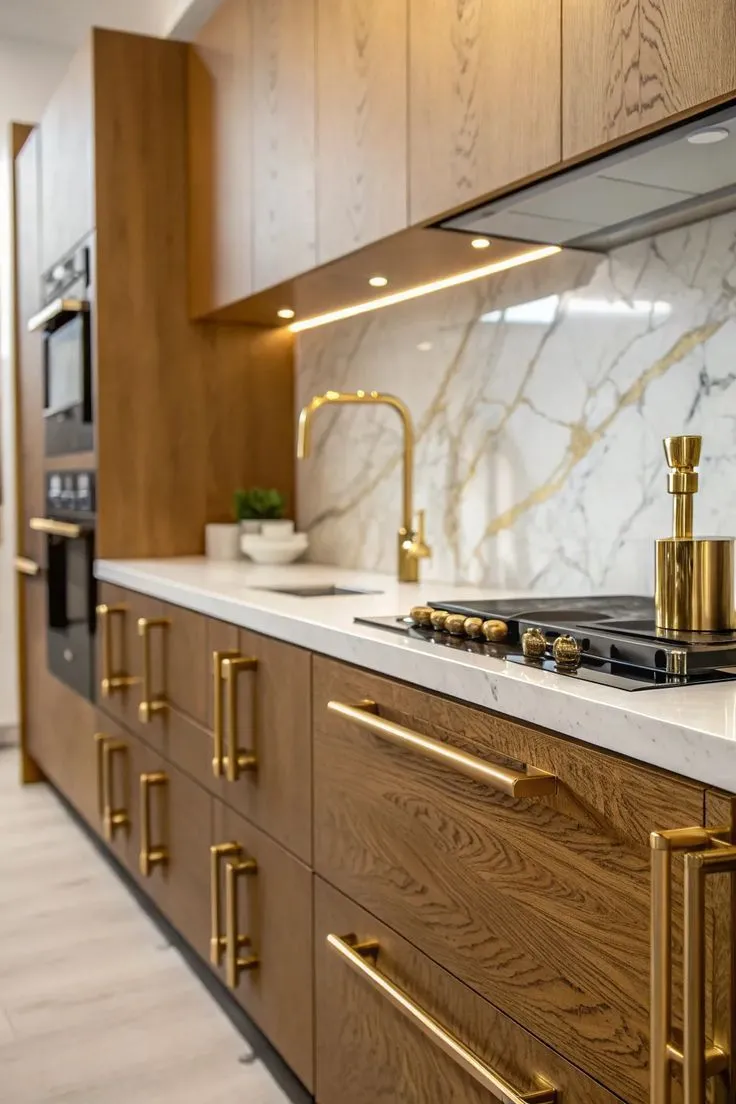
Pairing white tiles with metal finishes is a quiet way to add richness, without going over the top.
Incorporating brass, chrome, or matte black with white tiles creates a luxe yet restrained aesthetic. Some of the most popular use of such combinations is brushed gold handles with a white marble backsplash, or chrome trims around white tiled niches.
Mixing white tiles works well in kitchens and bathrooms. You can switch to brass or gold-toned fittings (taps, handles, trim lines). The result is elegant without being flashy.
These finishes also work well under warm lights, which many Indian homes prefer. And compared to the usual chrome, brass or brushed gold offers something softer and more styled.
White Tiles with Deep Green Accents
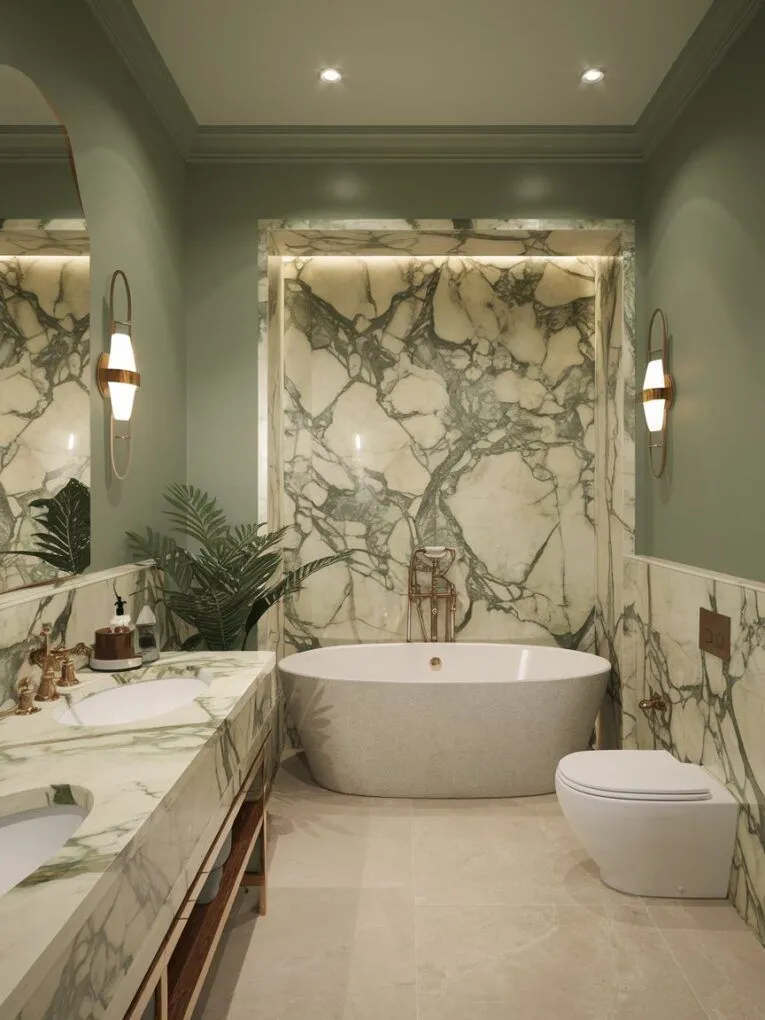
If you want to keep things earthy yet styled, green and white is a timeless pairing that still feels current.
Forest green and bottle green sit beautifully against white. Use them in cabinetry, open shelves, or even a strip of coloured tile running through a white wall.
It’s one of the white tile pairings that feels calm but not cold. And with Indian design trends shifting toward natural materials, this combination feels right in both old and new homes.
Mixing White Tiles: Matte and Gloss
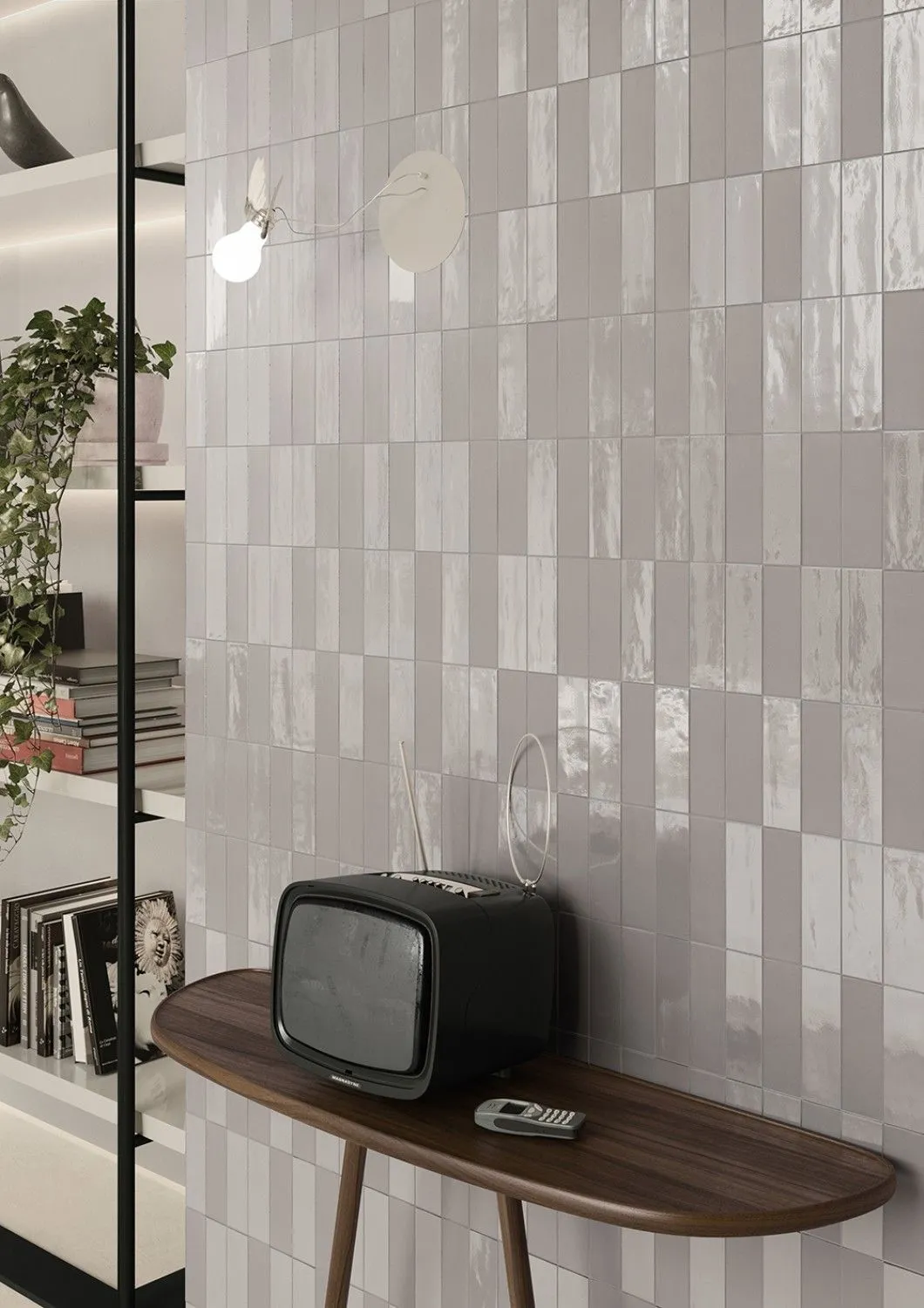
Use finish and texture contrast to make white tiles feel layered, not flat.
When it comes to white tiles combinations, sometimes it’s less about colour and more about contrast in texture. Mixing matte and glossy white tiles adds subtle definition. Just switching finishes can bring dimension and prevent a space from feeling flat. For instance, use glossy white tiles on the lower half of the wall — they reflect more light and are easier to wipe down. However, keep the upper half matte for a softer look, especially in spaces without strong ventilation.
It’s subtle, but effective. Especially in spaces that don’t need a lot of colour, just texture.
White Tiles Pairing with Stone-Look Surfaces
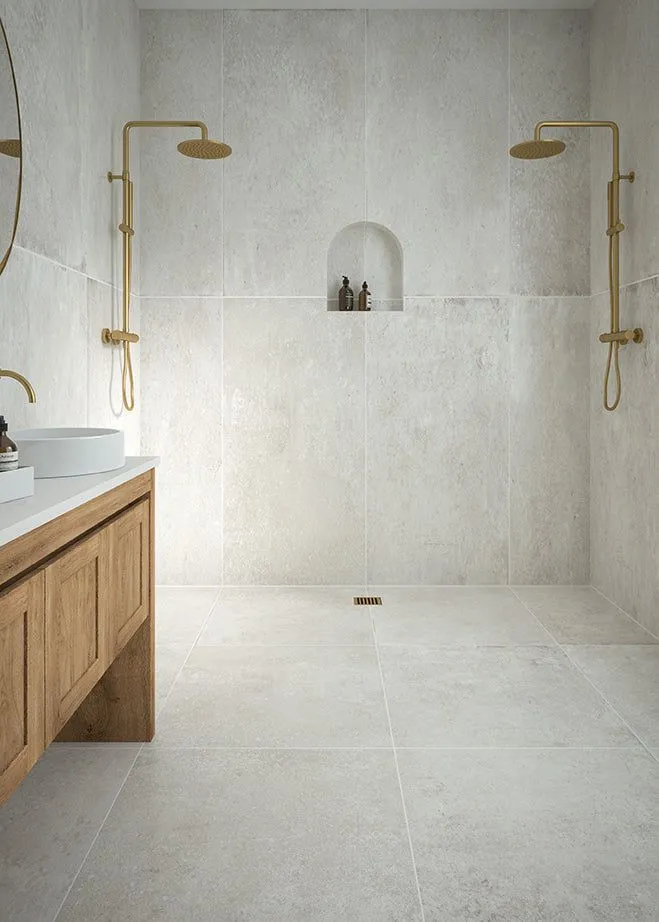
Mimic the look of stone with low-maintenance tiles — and let the white keep things light and balanced.
Many tile makers now offer styles that mimic natural stone. Pair these with simple white tiles and you can achieve a layered, earthy look without high maintenance.
This mix works especially well in Indian foyers, corridors, or balcony walls. The white adds openness, while the stone-look surface brings in natural variation.
White Subway Tiles with Dark Grout
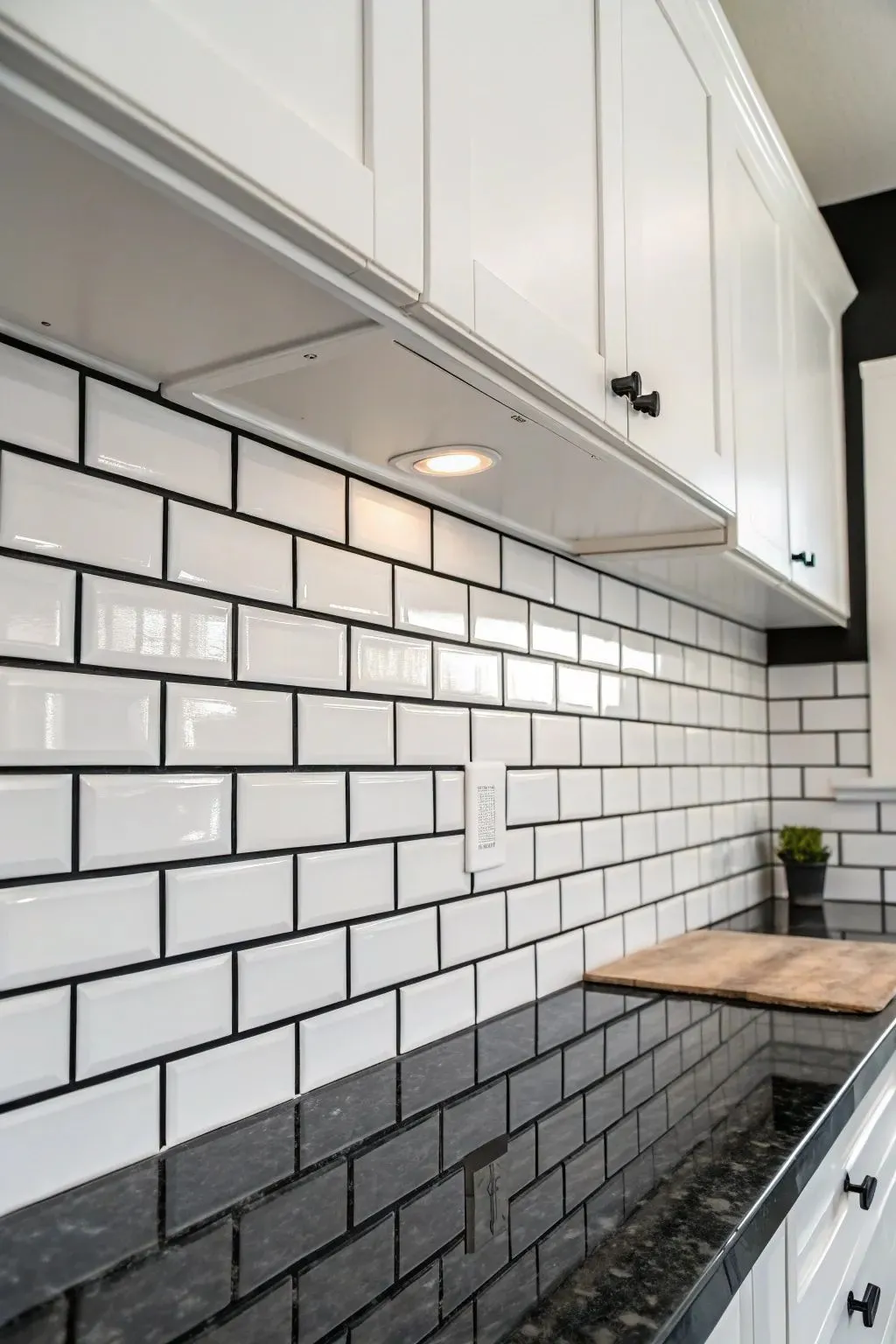
Switching up your grout shade can redefine the tile entirely — both in look and practicality.
Subway tiles are a familiar sight — but change the grout colour and they look entirely different. Dark grout outlines each tile, adds structure, and makes the layout pop.
This is more than a design move. In Indian homes where light grout can stain quickly, dark grout helps hide turmeric spills or hard water marks.
White Tile Combination with Terrazzo or Mosaic Inserts
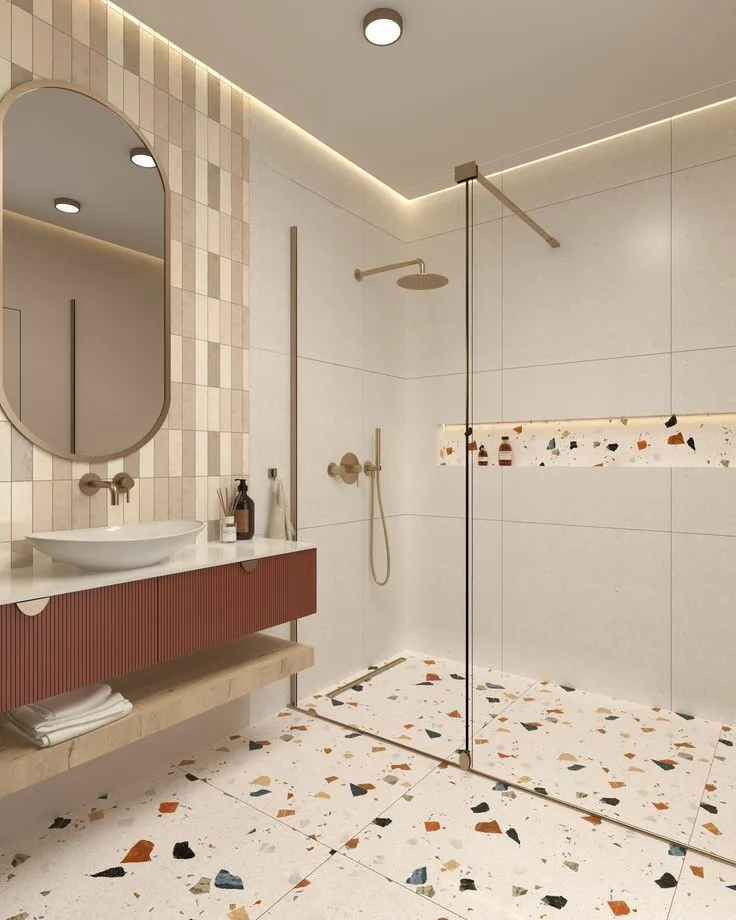
Small terrazzo or mosaic sections can break the monotony and add rhythm without busying the space.
Instead of going all-in with terrazzo, try combining it with white tile. You can use terrazzo as a border, in the niche, or along the flooring skirting. Mosaic inserts—especially in natural stone or soft-coloured glass—work the same way.
Mixing white tiles with terrazzo adds rhythm to the space without clashing. Ideal for powder rooms, kitchen corners, or even wall niches in shower areas.
White Tiles Combination with Pastels
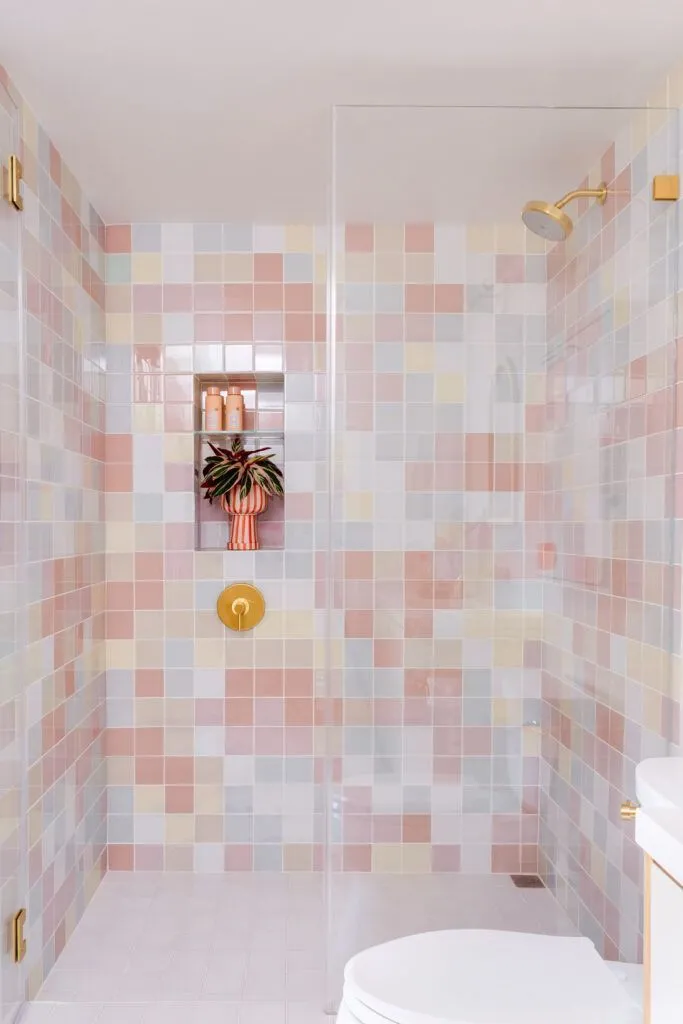
Pastels and white can soften tight spaces — especially when gloss is toned down and textures stay matte.
Soft colour doesn’t mean childish. When paired with white tiles, pastels can bring a gentle lift — especially in bathrooms, dressing rooms, or study corners.
Mint green, dusty pink, powder blue — all work. In Indian settings with limited natural light, this white tile combination helps keep things airy. Just go easy on gloss, and opt for satin or matte pastels for a more grown-up feel.
Mixing White Tile with Black Accents
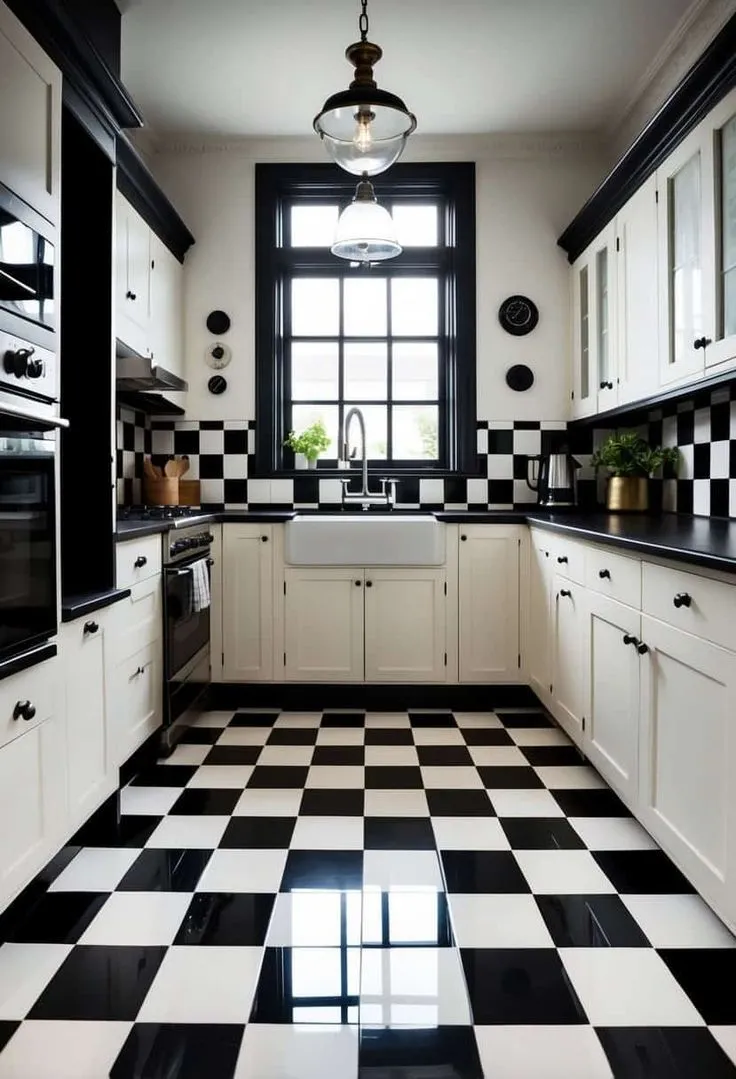
Black adds edge — just enough to frame white tiles without overpowering their clean finish.
Monochrome still holds strong. A thin black border around white tiles, a dark window frame, or even matte black hardware can add sharpness and definition.
Use this in moderation if space is tight. A small black line on the floor or a dark fixture can be enough. In larger areas, bolder shapes or checkerboard styles may work — but always balance the two so one doesn’t overpower the other.
White Tiles Combination: Layout and Pattern Matter
When working with white tiles, your layout makes a big difference.
Herringbone, stacked vertical, or offset brick patterns can completely shift the room’s mood, even if the tile colour stays the same.
Want a more contemporary look? Go for vertical stacking. Prefer a softer, more traditional vibe? Offset layouts or basketweave designs work well.
Smaller tiles (like hexagons or mosaics) give more grip underfoot and can be great for shower floors. Use scale to your advantage based on the function of the space.
Tips on Designing With White Tiles
In today’s homes, white tiles aren’t just about simplicity — they’re a useful anchor for the way many people are designing now. Open layouts, natural materials, and softer palettes are in focus, and white blends into that gently. It doesn’t fight for attention but lets other elements — wood, metal, pastel cabinetry — step forward.
One reason white tiles still hold ground is how easily they adapt. You can flip the look of a space just by changing the grout colour, switching to a different tile size, or mixing in a new finish.
Take large-format tiles, for example. With fewer joins and minimal grout lines, they stretch across a space without breaking it up. At the other end, mosaic tiles — tiny and patterned — can be used to add just a touch of detail. Pairing both in the same space is a quiet way to break monotony.
Grout itself deserves more thought than it usually gets. A dark grout line can outline your tile layout and add some rhythm. Go tone-on-tone if you prefer a cleaner finish. Even colour comes into play — a deep blue grout with white tiles gives a cool, coastal feel, while black lends a sharp, graphic edge.
In Indian homes, white floor tiles come with functional upsides too. They help reflect sunlight and reduce indoor heat, especially during summer. But in cooler regions or shaded rooms, pairing white with warmer elements — like natural wood, woven textiles, or soft paint colours — helps avoid that sterile, empty look.
Final Thoughts on White Tile Combinations
White tiles can feel plain — until you see how many directions they can go. Whether you’re working with a tight budget or redesigning from scratch, how you pair and finish your white tiles decides the mood.
For the right white tiles combination, think beyond just clean and bright. It’s all about how to pair, contrast, and layer them for character and cohesion. Play with materials, contrast finishes, or shift your palette gently. With the right mix, white tiles stop being a background — and start setting the tone.

Comments